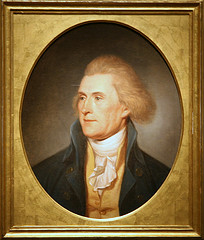Posted by Roberta Grimes • December 06, 2013 • 1 Comment
Afterlife Research, Thomas Jefferson
 Two of my big interests have long been researching death and better understanding Thomas Jefferson, and it’s fun when those interests come together! I met Jefferson in 1988 when I found the first volume of Alf Mapp’s excellent biography, Thomas Jefferson – A Strange Case of Mistaken Identity, a book that is even more timely today. How could anyone not love the young Jefferson? I fell in love, and I began an obsessive research project that culminated in the publication of My Thomas in 1993. I was less interested in Jefferson’s later years, in part because I found those years so sad: after Martha died he was a broken man, and he remained in important ways broken. But I knew about the not-so-strange coincidence of his having died fifty years to the day after the date that we now assign to the Declaration of Independence, and I knew that his great friend John Adams also died on that day. Jefferson died at about one o’clock in the afternoon, and it is reported that sometime before he died four hours later, Adams stirred and said his final words: “Thomas Jefferson still survives.”
Two of my big interests have long been researching death and better understanding Thomas Jefferson, and it’s fun when those interests come together! I met Jefferson in 1988 when I found the first volume of Alf Mapp’s excellent biography, Thomas Jefferson – A Strange Case of Mistaken Identity, a book that is even more timely today. How could anyone not love the young Jefferson? I fell in love, and I began an obsessive research project that culminated in the publication of My Thomas in 1993. I was less interested in Jefferson’s later years, in part because I found those years so sad: after Martha died he was a broken man, and he remained in important ways broken. But I knew about the not-so-strange coincidence of his having died fifty years to the day after the date that we now assign to the Declaration of Independence, and I knew that his great friend John Adams also died on that day. Jefferson died at about one o’clock in the afternoon, and it is reported that sometime before he died four hours later, Adams stirred and said his final words: “Thomas Jefferson still survives.”
I have known these facts for a quarter of a century and thought nothing of them. It was only yesterday, in an exchange of emails with the venerable Stafford Betty, professor of religion at California State University at Bakersfield and a leading afterlife expert, that I saw the obvious. Dr. Betty has surmised that Adams must have had a deathbed visit from Jefferson. Of course! He’s right!
It is usual, and probably universal, for one or more of our dead loved ones to be present at our deaths, visible to us and sometimes visible to others in the room. They are there to assist us in making the transition, since without their help there is a risk that we will be distracted and won’t efficiently move on to the higher vibratory levels of reality where the dead reside. It is similarly not uncommon for people who have just left their bodies with a distant loved one in mind to appear to that loved one as part of the natural transition process. Jefferson died in Virginia, while Adams died in Massachusetts. In the post-death reality there is no distance, and it is reasonable to assume that as Jefferson was dying he might have been wondering if his ancient friend Adams, then in his nineties, might still be alive. For him to have appeared to Adams would have been an easy and unremarkable event.
There is no other good explanation. The two were close friends through much of their lives, and after a political estrangement in the early 1800s they spent their last years exchanging letters that were full of genuine affection. But by their deaths they hadn’t seen one another in decades. John Adams died surrounded by his loving family, but all conversation with them had ceased. Why on earth would he have randomly stirred when he was only minutes from death and speculated about whether Jefferson might be about to beat him in the lottery to become the last Founding Father to die?
Adams wasn’t speculating. The event so momentous that it prompted a moribund man to speak aloud was the sudden appearance of Jefferson himself, standing by his bed, perhaps saying the like of, “Come along with me, Adams – dying is easy.” And I like to think that on Jefferson’s arm was the wife he had pined for most of his life, smiling up at him in the sweet joy of their being together now forevermore.
Wonderful post, Roberta. So well told.